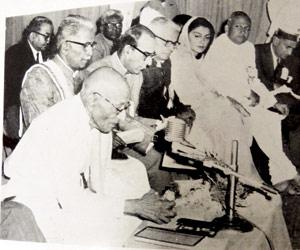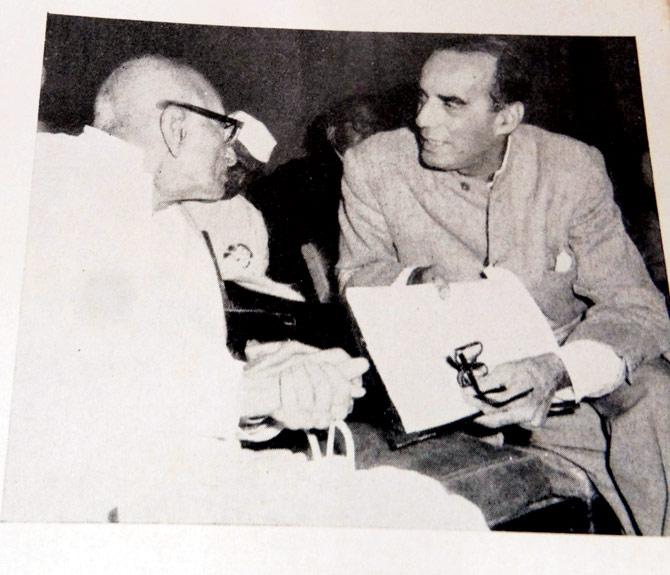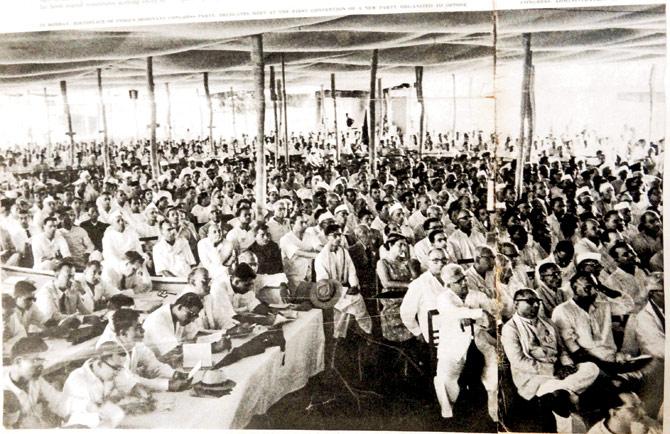In the 1960s, they spoke of globalisation, ending the Licence Raj, transparency in funding and giving lessons in democracy. A new archive of the party that didn't make it to the '80s reveals why there's still much we can learn from it


Rajaji was against the socialist and dynastic policies of the Congress, much as he shared a personal equation with Nehru
Delhi-based senior journalist Seetha recalls with sharp detail an article she'd written for the evening edition of a national daily during her stint in Mumbai in 1980s. March 17, 1984. The article in question was about a programme called the Leslie Sawhny Programme of Training for Democracy, set up by Minoo Masani i.e. Minocher Rustom Masani, a politician who had left e legal practice in England to join the freedom struggle and later, founded the Swatantra Party along with C Rajagopalachari and N G. Ranga. "Masani set up several bodies that addressed different issues from euthanasia to training in democracy. He realised that cadre-based parties such as the Jan Sangh and the communist parties had an advantage over others because they were able to mould members in a certain way. The Leslie Sawhny programme was set up to train young people in democratic values," says Seetha who in her involvement with the liberal movement in India often engaged with Masani and the party's secretary S V Raju.

Two of the founders of Swatantra Party, C Rajagopalchari (Rajaji) and Minoo Masani in conversation
Founded in 1959, in opposition to the socialistic principles of the then Congress government, the Swatantra Party stood for market-based economy and the dismantling of the license raj. In fact, in his inaugural address C Rajagopalachari, who also served as the Governor-General of India and then held various ministries under the Jawaharlal Nehru government, he stated: "The State is becoming a giant entity by itself menacingly poised against the citizen, interfering with his life at all points, mistrusting the people, imposing restrictions, introducing a series of controls and regulations, stepping into the fields of agriculture, industry and trade, creating an army of officials, tremendously increasing the cost of administration and therefore the taxes paid by the nation, hypnotising the people with slogans that are mistaken for thought and wisdom, a scheme of Government in which it is taken for granted that the citizen is ignorant of what is his own interest." And while the words of Rajaji, as he was also known, resonate, the party itself didn't enjoy a long career. Two years after his death, the party was dissolved. And, now, 44 years later it is being revived.

The party emerged as a strong opposition to the Congress but dissolved in 1974 two years after Rajaji's death
Of interest again
Delhi-based think-tank Centre for Civil Society (CCS) has, for the last three years, been working to bring together papers pertaining to the Swatantra Party. "The things we take for granted today were the issues they [the party members] were addressing in the 1960s, such as globalisation, promotion of small scale industries etc," says the founder of CCS, Parth Shah. But, more importantly, in a point that Seetha also hits upon, are issues that will remain true in all periods: how political parties themselves should be run.
The party, says Shah, had detailed notes on how to collect funds and ideas on internal party democracy — being against dynastic politics. "The party's secretary SV Raju kept notes on the day-to-day functioning of the party and its ethical principles," he adds. Raju had planned to write a book on the party's history but passed away in 2015 before he could complete it. Raju's family decided to gift the papers to CCS hoping it would build an archive on the party. By then CCS was already working on a portal to compile Indian liberal writings (indianliberals.in) and archiving the Swatantra Party documents fit right into that programme.

The manifesto that the Swatantra Party released. CCS founder Parth Shah finds that the economic and political ideas that they discussed then, such as globalisation, transparency etc, still remain pertinent. PIC Courtesy/ CCS archives
Putting the 1960s online
Documents, however, is an umbrella term. In the same pile as daily bills, the documents that CCS has digitized — a process that took it a year (six months to identify the right vendor and another six months to ensure that a thorough job was done) — also include letters written by Rajaji to Indira Gandhi, letters party dignitaries wrote to each other, manifestos in regional languages, party souvenirs, speeches, letters written to the party. "There a lot of articles written, or correspondence within high level members events of the time that haven't been in the public domain. These give us a sense of events in the country at the time," adds Shah.
Aarushi Vats, the CCS archivist who has been working on the project, says what the pages — there are 27,000 of them that went to Delhi from Mumbai in five large trunks on a train — also throw up are the lesser known names associated with the party. "Gayatri Devi was actively involved and was there for all meetings and campaigns. Homi Mody, after whom a street has been named in Mumbai, was also a member of the party. But so little is known about most members aside from the core members," she adds..
The next step
But this is where the work of the last three years comes in. The CCS, having digitised the papers, will now hand them over to Delhi-based institution The Nehru Memorial Museum & Library (NMML) where the papers will be made accessible to researchers. Marking the launch of the archives (which will also be available on indianliberals.in soon) is an exhibition that both CCS and NMML will host on February 3, to start a dialogue on the party and also promote researching its history. But, more papers are to come. Shah says there are members of the party who were active at the time or their children/grandchildren who have come forward and have expressed an interest in sharing the material they have.
What Shah doesn't have an answer for is why the party lost steam. In 1996, the Maharashtra unit of the party, led by Raju decided to revive it. However, when they tried to re-register it, they were told that the Indian law demands that all parties swear allegiance to socialism, in accordance with a 1989 amendment of India's Representation of People's Act. This being against the party's principles, Raju filed a writ petition in the Bombay High Court challenging this provision. Seetha says, "Raju was very pained that this hadn't even come up for a hearing. It disappointed him a lot."
Download the new mid-day Android and iOS apps to get updates on all the latest and trending stories on the go
 Subscribe today by clicking the link and stay updated with the latest news!" Click here!
Subscribe today by clicking the link and stay updated with the latest news!" Click here!







